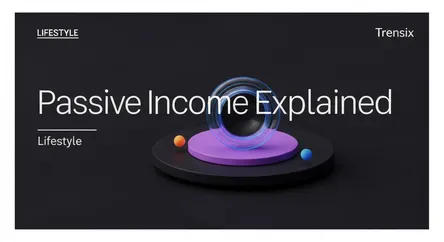Lifestyle
Passive Income Explained

Discover passive income: earning money with minimal daily effort. Learn how real estate investing can create financial freedom and long-term wealth.
What is it?
Passive income is money earned from a source where an individual is not actively involved on a daily basis. Unlike active income from a traditional job, it requires an initial investment of money or time to set up, but then continues to generate revenue with minimal effort. In real estate, the most common example is rental income from a property you own. Other forms include earnings from Real Estate Investment Trusts (REITs) or returns from property crowdfunding platforms. It's about making your assets work for you.
Why is it trending?
The concept of passive income is booming as more people seek financial independence and a better work-life balance. The desire to escape the "9-to-5" grind, build wealth for retirement, and create a safety net against economic instability fuels its popularity. In real estate, technology has made it more accessible than ever. Online platforms simplify property discovery, management, and fractional ownership, lowering the barrier to entry for aspiring investors who want to generate rental income without being traditional landlords.
How does it affect people?
Generating passive income through real estate can fundamentally change a person's financial landscape. It provides an additional revenue stream that can supplement a salary, pay off debts, or be reinvested to accelerate wealth creation. For many, it's a strategic pathway to achieving financial freedom, enabling early retirement, or funding life goals like travel. While it promises less hands-on work, it requires significant upfront capital, risk assessment, and smart management to be successful.